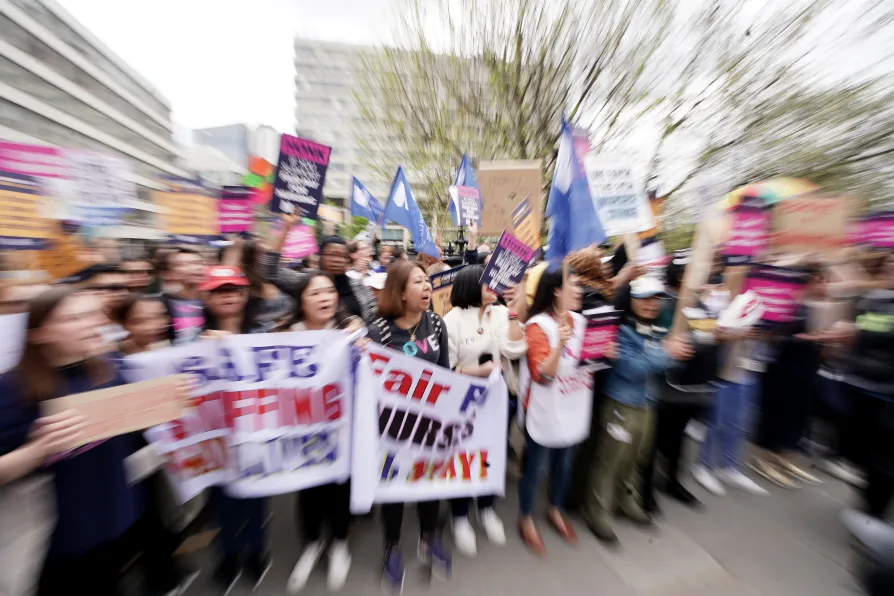
 NHS workers on the picket line outside St Thomas' Hospital, London, ahead of a march from the hospital to Trafalgar Square, May 1, 2023
NHS workers on the picket line outside St Thomas' Hospital, London, ahead of a march from the hospital to Trafalgar Square, May 1, 2023
THE Royal College of Nursing (RCN) warns of pay strikes unless ministers show they are serious about investing in the NHS workforce.
Following Unite and GMB health workers’ rejection of the 3.6 per cent award for 2025-26, it raises the spectre of the kind of co-ordinated NHS-wide strikes that forced Tory ministers to retreat in 2022-23. The largest health union, Unison, is still consulting members, but the scale of unhappiness indicated so far — RCN members rejected the offer by over 90 per cent — indicates Labour has a huge problem on its hands.
The NHS is Britain’s biggest employer: decisions here have implications for public-sector pay, and for taxation and spending, overall. They also affect workers’ leverage across the whole economy.
The NHS is also Britain’s most cherished public service. Governments are judged on public satisfaction with it.
Its popularity has implications for the left, too. There is scope to build mass campaigning around NHS disputes.
That’s important given the threats it faces: a determination to deepen reliance on the private sector from Health Secretary Wes Streeting; pressure from capital to erode the principle of care free at the point of use, most recently in the International Monetary Fund’s suggestion that we charge for NHS appointments; and the fact that Reform UK, a party fundamentally hostile to it which seeks to replace it with a voucher system to access care, has a steady lead in opinion polls.
Disputes, if they take place, will be about pay restoration. This is in itself hugely political. The government trots out the same line as for resident doctors, who have just undertaken five days of strikes: health workers have had a couple of above-inflation awards, and should be grateful.
The counter-argument — applying just as strongly for nurses and other NHS workers as for doctors — is that pay is far lower in real terms than it was 15 years ago. RCN research suggests nurses would be earning an extra £8,000 a year had pay kept up with inflation since then.
Labour can blame the Tories for the decline. But unless it shows it has a vision for pay restoration, it will fall into the gulf between popular expectations of what electing a Labour government was for and the reality that it is continuing the Conservative squeeze on incomes. It is already unpopular: it cannot easily weather prolonged disputes in the biggest public service.
That NHS strikes would discredit Labour is clear.
Their wider political impact depends on the socialist left winning the arguments they will prompt in homes and workplaces. The public is divided: a YouGov survey finds 47 per cent broadly supportive of nurses striking, and 43 per cent broadly opposed.
The Tories have already reacted to doctors’ strikes by saying they would ban them: and Reform would use strikes to propagandise against the entire NHS model.
But for the left, this is a battle of ideas worth joining.
Why do health workers earn so much less than they did a generation ago — indeed, why is that true for workers in general? Is the NHS really unaffordable, or have marketisation, PFI loans and Big Pharma’s control of drug prices loaded on unnecessary costs? Is the extraordinary concentration of wealth at the top linked to the decline in pay and public services?
Nothing empowers workers so much as taking collective action to improve their lot. Disputes placing unions in direct confrontation with Labour will also wrongfoot its right-wing leadership and encourage its reawakening left, while providing a platform for socialist organisation well beyond Labour: and a nationwide debate on the NHS and what health workers are worth is the best possible terrain on which to expose the anti-working-class character of Reform.
It is early days yet. But health workers deserve pay restoration: and the fight to win it could change the political weather.










